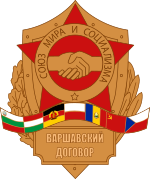
Back Warskouverdrag Afrikaans Warschauer Pakt ALS حلف وارسو Arabic حلف وارسو ARZ Pautu de Varsovia AST Varşava Müqaviləsi Təşkilatı Azerbaijani Варшава Килешеүе Ойошмаһы Bashkir Varšovas pakts BAT-SMG Варшаўскі дагавор Byelorussian Варшаўская дамова BE-X-OLD
 | |
 The Warsaw Pact in 1990 | |
| Abbreviation | TFCMA, WP, WTO |
|---|---|
| Successor | Collective Security Treaty Organization |
| Founded | 14 May 1955 |
| Founded at | Warsaw, Poland |
| Dissolved | 1 July 1991 |
| Headquarters | Moscow, Russian SFSR, Soviet Union |
Membership | |
| |
| |
| Affiliations | Council for Mutual Economic Assistance |
The Warsaw Pact (WP),[d] formally the Treaty of Friendship, Cooperation and Mutual Assistance (TFCMA),[e] was a collective defense treaty signed in Warsaw, Poland, between the Soviet Union and seven other Eastern Bloc socialist republics of Central and Eastern Europe in May 1955, during the Cold War. The term "Warsaw Pact" commonly refers to both the treaty itself and its resultant military alliance, the Warsaw Treaty Organization[5] (WTO).[f] The Warsaw Pact was the military complement to the Council for Mutual Economic Assistance (Comecon), the economic organization for the Eastern Bloc states.[6][7][8][9][10][11]
Dominated by the Soviet Union, the Warsaw Pact was established as a balance of power or counterweight to the North Atlantic Treaty Organization (NATO) and the Western Bloc.[12][13] There was no direct military confrontation between the two organizations; instead, the conflict was fought on an ideological basis and through proxy wars. Both NATO and the Warsaw Pact led to the expansion of military forces and their integration into the respective blocs.[13] The Warsaw Pact's largest military engagement was the Warsaw Pact invasion of Czechoslovakia, its own member state, in August 1968 (with the participation of all pact nations except Albania and Romania),[12] which, in part, resulted in Albania withdrawing from the pact less than one month later. The pact began to unravel with the spread of the Revolutions of 1989 through the Eastern Bloc, beginning with the Solidarity movement in Poland,[14] its electoral success in June 1989 and the Pan-European Picnic in August 1989.[15]
East Germany withdrew from the pact following German reunification in 1990. On 25 February 1991, at a meeting in Hungary, the pact was declared at an end by the defense and foreign ministers of the six remaining member states. The USSR itself was dissolved in December 1991, although most of the former Soviet republics formed the Collective Security Treaty Organization shortly thereafter. In the following 20 years, the Warsaw Pact countries outside the USSR each joined NATO (East Germany through its reunification with West Germany; and the Czech Republic and Slovakia as separate countries), as did the Baltic states.
Cite error: There are <ref group=lower-alpha> tags or {{efn}} templates on this page, but the references will not show without a {{reflist|group=lower-alpha}} template or {{notelist}} template (see the help page).
- ^ Cite error: The named reference
:0was invoked but never defined (see the help page). - ^ Cite error: The named reference
:1was invoked but never defined (see the help page). - ^ "Протокольная запись заседания Президиума ЦК КПCC (к пункту I протокола № 49)".
- ^ "Slovenské pohl'ady". Matica slovenská. 1997 – via Google Books.
- ^ "Milestones: 1953–1960 – Office of the Historian". history.state.gov.
- ^ Cite error: The named reference
History Channel 1was invoked but never defined (see the help page). - ^ Cite error: The named reference
History Channel 2was invoked but never defined (see the help page). - ^ Cite error: The named reference
NATO short historywas invoked but never defined (see the help page). - ^ Cite error: The named reference
Laurien Crump Routledge page 21-22was invoked but never defined (see the help page). - ^ Debra J. Allen. The Oder-Neisse Line: The United States, Poland, and Germany in the Cold War. p. 158. "Treaties approving Bonn's participation in NATO were ratified in May 1955...shortly thereafter Soviet Union...created the Warsaw Pact to counter the perceived threat of NATO"
- ^ "Text of Warsaw Pact" (PDF). United Nations Treaty Collection. Archived (PDF) from the original on 2 October 2013. Retrieved 22 August 2013.
- ^ a b Cite error: The named reference
Yoder1993was invoked but never defined (see the help page). - ^ a b Cite error: The named reference
Reinalda2009was invoked but never defined (see the help page). - ^ [1] Archived 23 December 2015 at the Wayback Machine Cover Story: The Holy Alliance By Carl Bernstein Sunday, 24 June 2001
- ^ Roser, Thomas (16 August 2018). "DDR-Massenflucht: Ein Picknick hebt die Welt aus den Angeln" [Mass Exodus of the GDR: A Picnic Clears the World]. Die Presse (in German).